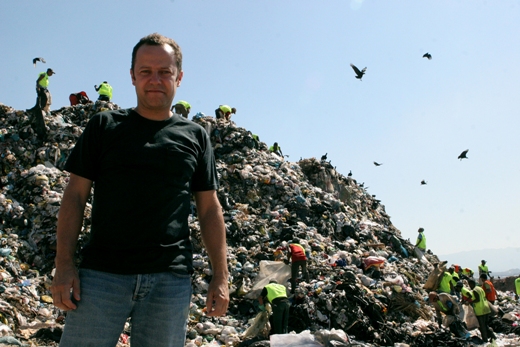
Most people don’t really want to think about trash, much less touch it, yet we create trash every day of our lives. Waste Land, a documentary feature by director Lucy Walker, follows artist Vik Muniz as he enters the lives of the catadores – “pickers” – in Jardim Gramacho, an enormous landfill just outside Rio de Janeiro, Brazil, where 7,000 tons of garbarge are deposited each day.
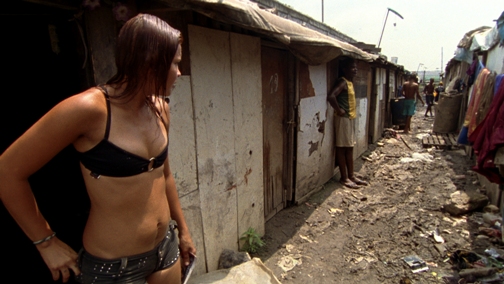
Muniz wants to “change the lives of a group of people with the materials they work with everyday” – in this case, garbage. Muniz and his collaborator Fabio Ghivelder become acquainted with the people of Jardim Gramacho, the catadores who search through the mounds of garbage for objects that can be sold for recycling. Ultimately, the project will involve creating large-scale portraits of the people they interview – Tiao, Zumbi, Suelem, Isis, Irma, Valter and Magna – all of whom participated in the process of making the art.
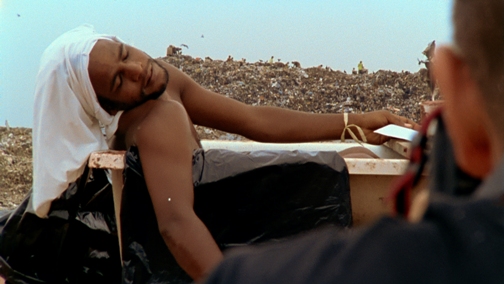
Bring all your post-modern cynicism and skepticism to this film, because just like the trash pickings that the catadores sell to be recycled – it will be transformed. Why does the film work?
This is not just another hit-and-run famous artist makes flamboyant gesture for humanity and flees back to fameland film. Muniz is not an outsider coming to intervene equipped with good will and ignorance, he is returning home. Growing up in a working class family in Sau Paulo, Brazil, Muniz was shot in the leg while trying to break up a street fight. Compensated for his injuries, he used the money to make his way to New York, where he began his career as an artist. For Muniz, the ability of art (and luck) to transform lives is not a myth, it is his autobiography.
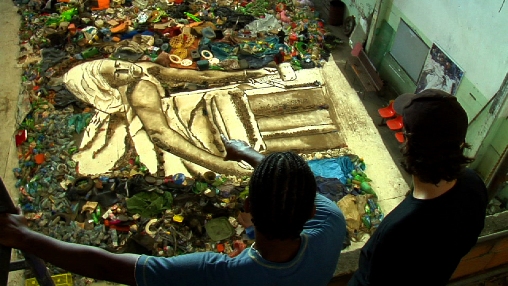
The sense of time is an essential element in the film. Muniz is aware that his intervention in the lives of these people is only a fleeting episode, and states his objectives in relation to that knowledge, setting his goals as “taking people away, even for a few minutes, from where they are and showing them a different place.” At the same time, he does not just fly into Rio, take a few photographs and move on. Muniz dedicates two years to this project, and the proceeds from the sale of the portraits are all dedicated to ACAMJG (Association of Collectors of the Metropolitan Landfill of Jardim Gramacho). Muniz and Ghevelder really do get to know the people they work with, and they too are affected by the process and changed through these relationships.
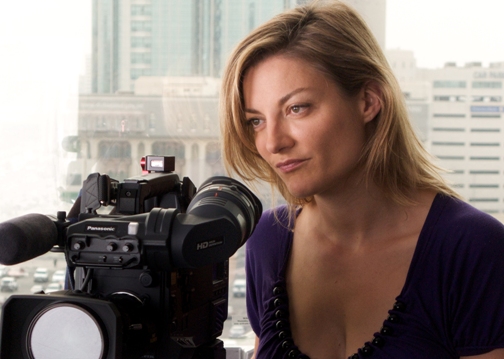
Walker has a message to convey, and she delivers it in a tightly structured film, with beautifully composed shots and a brightly colored palette that entices the eye, without denying the difficulty and complexity of the situation. One early scene between Muniz and his wife starts out feeling somewhat staged – as the couple sits down at the computer, Muniz shows her a YouTube clip of Jardim Gramacho and tells her that this is where he’ll be spending the next two years of his life. The expository Q & A that follows feels a little too structured, as it neatly describes the project, but as the two continue to converse, the neat picture unravels. Muniz’s wife Janine asks him about the hygiene and health risks involved in working on a landfill among the trash. When Muniz smiles and tells her that he doesn’t think that the catadores think about those issues when they are out there, she responds: “but we do.”
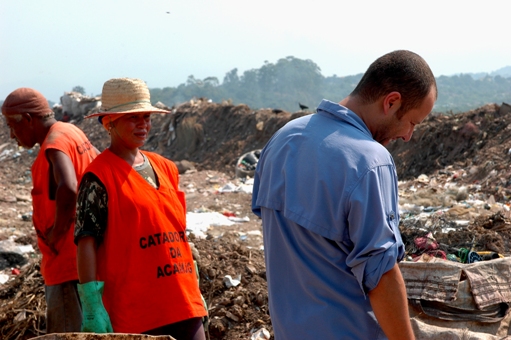
This acknowledgement of the distance between the lives of the artists and those of the people in Jardim Gramacho, the limits of the project and the uncertainty of its impact, redeems the film from the dangers of over-simplification and “feel-good” fallacies. There is no attempt to gloss over or hide the fact that Muniz can choose to spend time at Jardim Gramacho, and when the project is over, he will remain a successful contemporary artist, while in all likelihood, the catadores who participate in his art project will continue to pick through the trash.
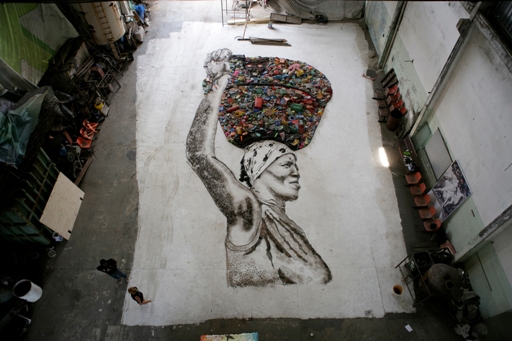
Waste Land neither glorifies nor demonizes poverty or the poor. The viewer becomes acquainted with the catadores and the circumstances of their lives. We see the impact of their involvement with Muniz and Ghivelder, which brings pain as well as joy, as the artists struggle with their own doubts and uncertainty in the course of the project. It is not a moral tract or didactic argument, instead, it is an aesthetic, intellectual and emotional experience to savor, and a suggestion – to look at the life in and around us with the eyes of an artist and see what we can make of it.
Waste Land
Directed by Lucy Walker
Co-directed by João Jardim and Karen Harley
Music: Moby
Featuring: Vik Muniz, Fabio Ghivelder, Isis Rodrigues Garros, José Carlos da Silva Baia Lopes (Zumbi), Sebastião Carlos dos Santos (Tiao), Valter dos Santos, Leide Laurentina da Silva (Irmã), Magna de França Santos, Suelem Pereira Dias
Waste Land (In English and Portuguese with Hebrew subtitles) will be screened at Epos, the International Art Film Festival which will take place from November 23 – 27, 2010. Screenings of Waste land: November 24 at 19:00, Jerusalem Cinematheque; November 25 at 19:00, Haifa Cinematheque (in the presence of the director); November 27 at 21:00, Tel Aviv Cinematheque (in the presence of the director); November 27 at 20:30 in Emek HaMa’ayanot at the Dance Center. Additional information can be found on the Epos Festival site.
The film is screened at the festival courtesy of Nachshon Films, and with the support of BI ARTS (British Israeli Arts Training Scheme), a British Council initiative in partnership with the Ministry of Foreign Affairs and the Ministry of Culture and Sport in Israel.
Waste Land will be will be shown Fridays and Saturdays at the Tel Aviv Cinematheque (03-6060800) beginning January 1, 2011, and Wednesday, January 5 at the Herzliya Cinematheque (09-9513361).






Comments are closed.